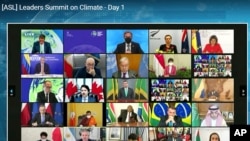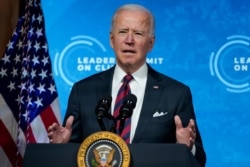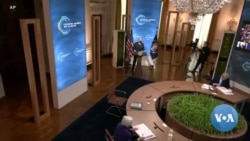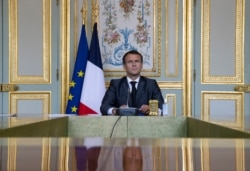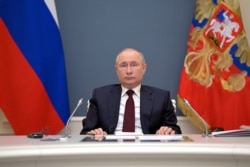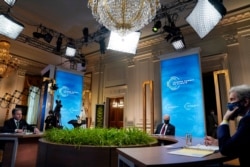Saying the world must “overcome the existential crisis of our time,” U.S. President Joe Biden announced a new goal of cutting U.S. greenhouse gas pollution by 50-52% by 2030 as he kicked off a virtual global summit on climate change with dozens of other world leaders.
"This is the decade we must make decisions that will avoid the worst consequences of the climate crisis," said Biden on Thursday, calling on others, in particular the world’s largest economies, “to step up.”
British Prime Minister Boris Johnson praised Biden’s announcement as “a game-changer," saying “it will have a transformative impact in the global fight against climate change."
“Is it doable? Will we probably exceed it? I expect yes,” John Kerry, the administration’s climate envoy told reporters when asked about the U.S. goal Biden announced. “Is it enough? No. But it’s the best we can do today.
The U.S. target is relative to 2005 levels and the White House says efforts to reach it include moving toward carbon pollution-free electricity, boosting fuel efficiency of cars and trucks, supporting carbon capture at industrial facilities and reducing the use of methane.
To the disappointment of the summit’s organizers and environmentalists, the world’s two most populous countries, China and India, made no new commitments on Thursday.
International pledges
Chinese President Xi Jinping said his country will strictly control coal consumption in the next several years and “phase down” the fossil fuel during the 2026-2030 period. Xi also reiterated China’s pledge to peak carbon emissions before 2030.
Indian Prime Minister Narendra Modi announced a partnership with the United States for a 2030 clean energy agenda “to help mobilize investment, demonstrate clean technology and enable green collaborations.”
United Nations Secretary-General Antonio Guterres told the summit: “We need a green planet — but the world is on red alert. We are at the verge of the abyss. We must make sure the next step is in the right direction. Leaders everywhere must take action.”
WATCH: Biden sets ambitious CO2 target
The two-day summit is part of Biden's efforts to restore U.S. leadership on the issue after his predecessor, Donald Trump, withdrew the United States from the legally binding Paris Agreement on Climate Change in 2017. Biden reversed the decision shortly after taking office.
Canadian Prime Minister Justin Trudeau also announced a goal of cutting emissions by 40%-45% by 2030 below 2005 levels.
Europe will apply emissions trading to buildings and transport, European Commission President Ursula von der Leyen told the summit, saying, "Carbon must have its price, because nature cannot pay the price any longer."
German Chancellor Angela Merkel expressed delight that the United States is cooperating again on climate politics.
“Thank you for this, and thank you for organizing this summit,” Merkel told Biden. “This is a herculean task because this is nothing short of a complete transformation, a complete change of the way we do business.”
The online event, with the participation of more than 40 leaders, was not without technical glitches. There was a distracting echo during the introductory remarks by U.S. Vice President Kamala Harris, as well as at the start of Biden’s statement.
Pre-taped remarks by French President Emmanuel Macron were halted in mid-statement for U.S. Secretary of State Antony Blinken to repeatedly introduce a visibly impatient Russian President Vladimir Putin, who sat in silence for nearly two minutes.
The Russian president said his country might introduce preferential terms and conditions for foreign investment in clean energy projects.
Following Putin’s speech, the remainder of Macron’s remarks were then aired in which he called for international regulations, saying, “If we don’t set a price for carbon, there will be no transition.”
Japanese Prime Minister Yoshihide Suga announced a new target for the world’s third biggest economy and fifth-largest carbon dioxide emitter.
“It will certainly not be an easy task,” said Suga of the new goal for his country that some environmental groups are finding disappointing.
“The Japanese government has raised its 2030 emissions reduction target to 46% from 2013 levels, but this is a paltry move compared to the large increases in reduction targets by other countries and it has dampened the reduction efforts of the international community,” said Greenpeace Japan in a statement.
Brazil's President Jair Bolsonaro, who has asked the United States for $1 billion in economic assistance in exchange for cutting deforestation of the Amazon rainforest by 40%, told the summit his country should achieve climate neutrality by 2050.
Vulnerable nations
Smaller nations were also heard on the summit’s first day, including leaders of some of those most vulnerable to climate change, such as Antigua and Barbuda in the Caribbean, Gabon in Africa and the Republic of the Marshall Islands in the Pacific Ocean.
Noting his Himalayan country is not only carbon neutral but carbon negative due to hydropower, Bhutan’s prime minister, Lotay Tshering, called on all countries “to set more ambitious targets.”
A Biden administration official told reporters in a briefing Wednesday that with the new U.S. target and those set by Japan, Canada, Britain and the European Union, “in aggregate, major economies accounting for more than half of the world's economy will now have committed to the pace of emission reductions required globally to limit warming to 1.5 degrees.”
Combating global warming
World leaders agreed to limit global warming to below 2 degrees Celsius in the 2015 U.N. Paris climate agreement and to aim for 1.5 degrees Celsius.
Averaged over the entire globe, temperatures have increased more than 1.1 degree Celsius since 1980. Scientists link the increase to more severe heat waves, droughts, wildfires, storms and other impacts. And they note that the rate of temperature rise has accelerated since the 1980s.
There is skepticism about the commitment announced Thursday by Biden and there is certain to be partisan political battle over his pledge to reduce fossil fuel use in every sector of the U.S. economy.
“Toothless requests of our foreign adversaries and maximum pain for American citizens,” reacted the top Republican party leader in the Senate, Mitch McConnell, calling Biden’s climate plan full of “misplaced priorities.”
The Washington Post newspaper, in an editorial published Thursday, said while the president’s promise is a big one, delivering will be much harder.
“The United States will require new transmission lines to send electricity from where the wind is blowing and the sun is shining to where it is not,” said the newspaper’s editorial board. “Huge amounts of new wind, solar and, potentially, nuclear and hydropower infrastructure must be built in a short time, and fossil fuel plants must be forced offline before their natural retirement dates. The electrification of vehicles is an even larger challenge. All this will require tremendous amounts of public and private investment.”
The new U.S. goal “is a significant step forward,” according to the Climate Action Tracker, an independent scientific analysis monitoring government climate action. But the international consortium added it is “still about 5% to 10% points short of a 1.5˚C compatible 2030 target.”




